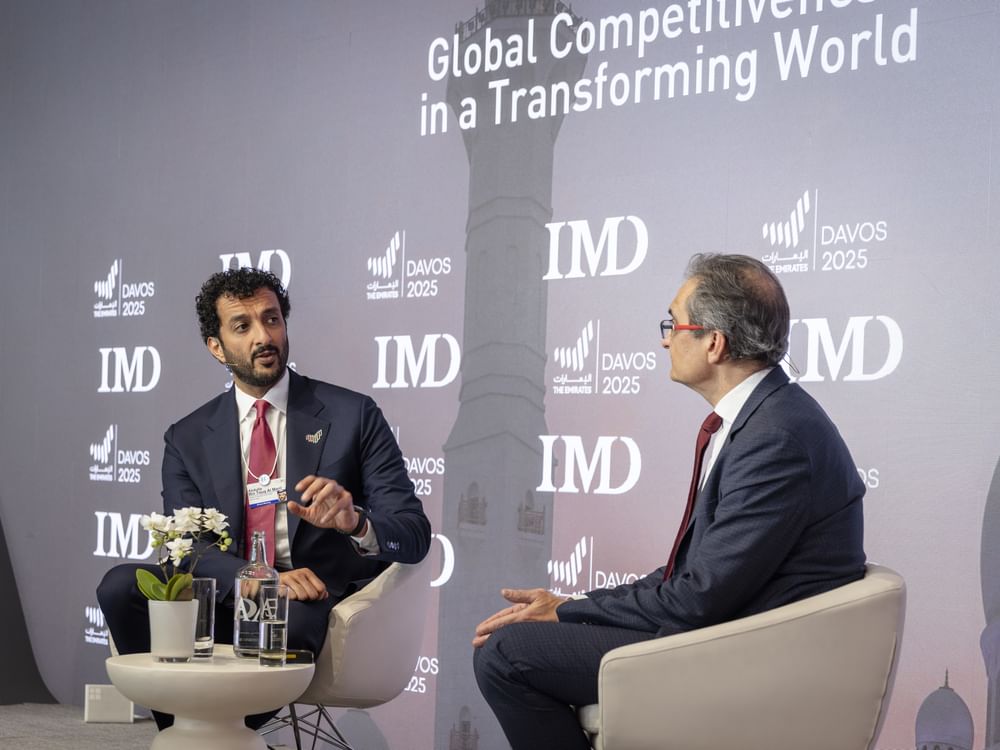Abdullah bin Touq Al Marri, the Minister of Economy, participated in a session titled ‘Global Competitive Edge in an Ever-changing World’ at the 55th World Economic Forum’s annual meeting in Davos . The event, themed ‘Collaboration for the Intelligent Age,’ features a UAE delegation led by H.H. Sheikha Latifa bint Mohammed bin Rashid Al Maktoum, Chairperson of Dubai Culture, consisting of over 100 members that include private sector representatives and government officials.

The session aimed to address the shifting landscape of global competitiveness amid rapid technological advancements, environmental challenges, and changing economic models. It discussed strategies for nations to maintain their competitive edge, emphasizing innovation, sustainable practices, and comprehensive policies that ensure resilience and long-term prosperity in an interconnected global environment.
Bin Touq stated that the UAE’s involvement in the World Economic Forum’s annual meeting underscores its significant role in promoting inclusive and sustainable economic development at both regional and global levels. He noted that this participation facilitates collaboration to devise effective solutions to global economic challenges. He attributed the UAE’s enhanced competitive edge to the guidance of its leadership and pointed out that the nation has implemented several national initiatives and strategies that have prepared it for future challenges while localizing advanced technologies for societal benefit.
He further highlighted the UAE’s impressive standing in global competitiveness indicators, mentioning that the country achieved top rankings in 223 global indicators in 2024. The UAE improved its position in the World Competitiveness Report 2024, climbing three spots to rank 7th globally. Additionally, it ranked first in 20 indicators of the Future Possibilities Index (FPI), according to the Global Future Possibilities Index 2024.
Bin Touq remarked on the remarkable outcomes the UAE has achieved in global competitiveness, which he believes reflects the resilience of its national economy. He emphasized that the UAE has surpassed the expectations of international institutions with its robust growth, currently hosting over 1.1 million companies and economic institutions that attract global investors and entrepreneurs.
The Minister also reiterated the UAE’s commitment to sustainability and economic diversification, noting that the contribution of non-oil sectors to the economy has risen to 75%. He mentioned ongoing national efforts aimed at transforming the UAE into a global hub for the new economy by the next decade, aligning with the ‘We the UAE 2031’ vision. This transformation encompasses sectors such as fintech, artificial intelligence (AI), entrepreneurship, advanced manufacturing, and food production, backed by a strong banking system and solid regional and global economic partnerships.
Bin Touq emphasized the need for a swift transition towards innovative technology and knowledge-based economic models to effectively navigate global economic shifts. He stressed that fostering adaptability and economic openness is crucial to address challenges like geopolitical tensions, inflation, protectionist measures, and oil price fluctuations.
He highlighted that enhancing competitiveness hinges on embracing innovations, research, science, and technology. Furthermore, developing a business environment conducive to investment and the growth of startups, while promoting effective public-private partnerships, is essential.
Moreover, the UAE’s commitment to digital transformation, human capital investment, and the advancement of AI technologies across various sectors is crucial for aligning innovation with economic outcomes. By participating actively in the World Economic Forum – Davos 2025, the UAE aims to solidify its role as an influential global player, driving sustainable economic development and leading innovation in key sectors such as technology, energy, trade, and environmental sustainability.

Leave a Reply